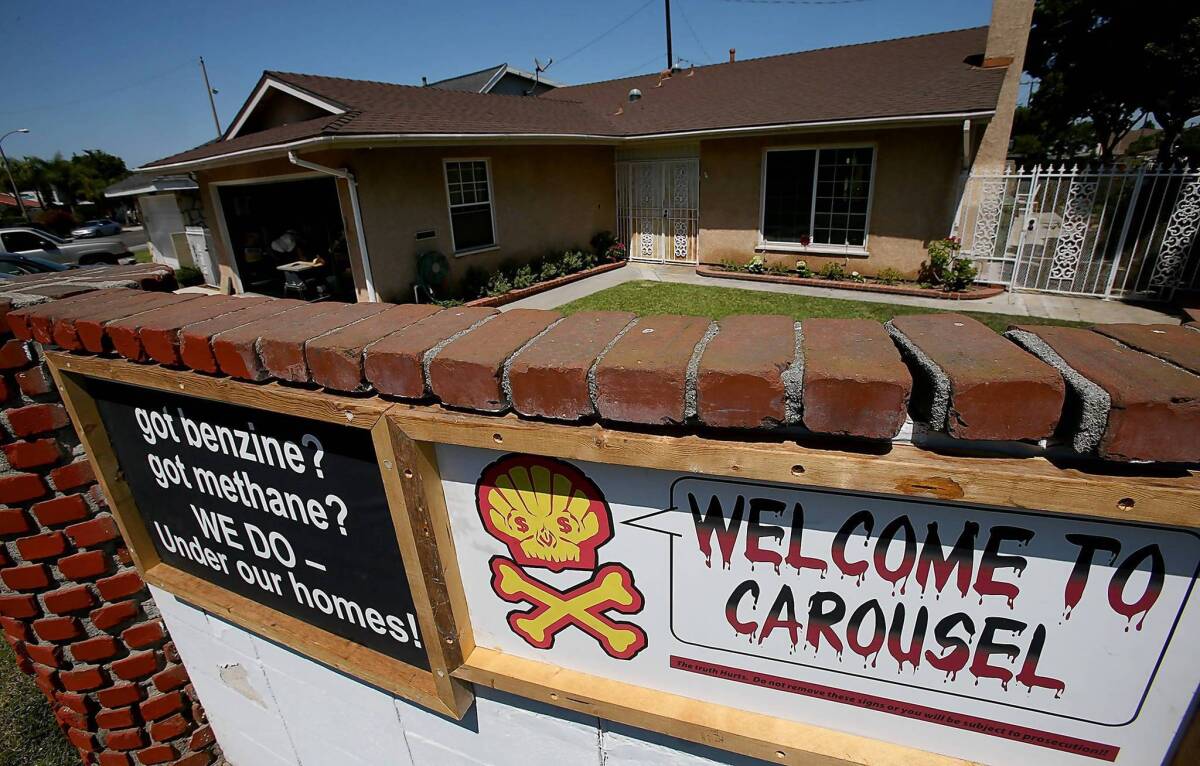Carson seeks to declare emergency to speed oil site cleanup

Carson city officials are seeking to declare a local emergency in an effort to pressure the state and an oil company to speed the cleanup of a contaminated housing tract where residents have been advised not to eat vegetables or fruit from their yards and to limit contact with the soil.
Testing in 2008 revealed that the soil and groundwater beneath many of the 285 homes in the Carousel tract, which sits atop a former Shell Oil tank farm, contain benzene and petroleum.
The oil company, which owned the land before it was developed into homes and which state officials said was responsible for its cleanup, has said that the chemicals do not pose an immediate health risk.
Cleanup is not expected to begin for at least another year.
“On a human level, five years is too long for residents to have to wait and still not know if anything is going to be done to protect their health and economic interests,” said Carson Mayor Jim Dear, who introduced the motion to draft the emergency declaration after experts testified at a recent City Council meeting that potentially harmful levels of benzene and methane gas existed in the soil.
“To me, there’s no excuse for delaying any action,” Dear said.
For years, the site has been the focus of investigations by state agencies, as well as lawsuits from residents who blame the contamination for cancer, skin rashes, and tumors in their pets.
The city joined residents in their lawsuit against Shell and the housing developer, now owned by Dole Food Co., last year. But with state environmental agencies taking the lead, Dear said, the city’s hands have been tied.
City officials are now examining whether an emergency declaration could grant them independent authority to order Shell to expedite the cleanup or give the city access to federal or state funds to help pay for it, City Atty. Bill Wynder said.
Sheri Repp-Loadsman, the city’s planning officer, added that Carson was still committed to working with the Los Angeles Regional Water Quality Control Board and would use the declaration, which council members could consider as early as Monday, as a “mechanism to express the city’s concern.”
In 2010, the water quality control board told residents not to eat fruit or vegetables grown in their yards. A letter from Shell urged homeowners to limit their contact with “exposed soils in your yard.”
Last fall, an AT&T; crew installing telephone lines reported petroleum oozing out of a three-foot-deep hole.
The water quality board ordered Shell to clean the 44-acre site more than two years ago.
Since then, investigators hired by the company have conducted yard-to-yard testing to determine whether hydrocarbons in the soil are converting to harmful vapors. Nearly all of the homes have undergone an initial round of testing. The frontyards of a few homeowners, part of a pilot cleanup program, have been dug up.
Still, a comprehensive cleanup plan hasn’t been filed with the water quality board, and additional community meetings and a separate environmental review for the plan could delay the actual cleanup until 2015.
Maria Mehranian, chairwoman of the water quality board, said the agency had done everything in its power to help residents.
“Within our jurisdiction and authority, we have taken all the steps,” Mehranian said. “I don’t want the community to think we have a magic wand. It’s important to understand that these are very complicated issues.”
So far, regulatory agencies have found no immediate threat to residents, said Shell Oil spokeswoman Kayla Macke in an emailed statement.
“We take the protection of the residents and the environment seriously and will continue to provide the necessary resources to remediate the neighborhood,” the statement said.
Dear said he believed that Shell had used delaying tactics and tried to limit the scope of the cleanup; he wants the firm to buy the homes of all Carousel residents before proceeding.
That’s what Barbara Post wants too. When she moved onto her block nearly 40 years ago, the development was one of the most desirable parts of town.
Now Post, president of the Carousel Homeowners Assn., says she feels “trapped” in her own home, which she says won’t sell because of the contamination concerns. She has spoken out at City Council and water quality board meetings for years.
“It’s been a long time coming for the city to join in with us, and we’re both on the same page now,” said Post, who at 78 is concerned that she might not live to see the cleanup completed.
“I just hope it’s going to help us a lot,” she said. “It has to.”
More to Read
Sign up for Essential California
The most important California stories and recommendations in your inbox every morning.
You may occasionally receive promotional content from the Los Angeles Times.











